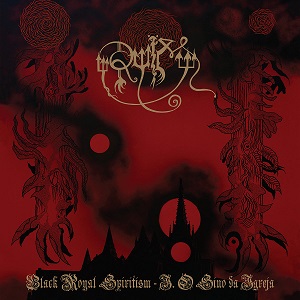At the helm of Mayhem’s post-Euronymous era starting in 1997 with Wolf’s Lair Abyss, guitarist Blasphemer (real name: Rune Eriksen) has proven himself as one of black metal’s top riff and songwriting tacticians. You can spot a Blasphemer riff from a mile away — they’re nihilistic, cavernous and weave serpentine chord structures easily. It’s why the aforementioned Wolf’s Lair Abyss, misunderstood Grand Declaration of War and underappreciated Chimera resonate so well — they’re Blasphemer’s creations. (Lest we discount his Mayhem swansong, 2007’s incredibly odd Ordo Ad Chao.) Blasphemer spinning his six-string web to black metal is not to be missed. Accordingly, his new venture, Ruïm, lives up to his lofty status.
Blasphemer has added vocals to his responsibilities, wisely eschewing a bigger name that could distract from the real purpose of Ruïm’s I. O Sino da Igreja debut: For Blasphemer to riff. And, obviously, he does just that, carpet-bombing the listener from the top on the sprawling opener “Blood.Sacrifice.Enthronement,” which even includes an interlude of near-total silence. The feverish “The Triumph (of Night & Fire)” offers a barrage of cascading, odd chord shapes before rustling up a blistering tremolo-on-thrash combo. “Black Royal Spiritism” features all the drama and near-apocalyptic wanderings of Grand Declaration of War, while a cover of Mayhem’s “Fall of Seraphs” is as nihilistic as the original.
Blasphemer injected a degree of sophistication and technicality into Mayhem. To see it carried over into Ruïm is heartening. If you close your eyes, “Evig dissonans” and “O Sino da Igreja” probably could have landed on a Mayhem album circa the late 1990s/early 2000s, but that’s the point. I. Indeed O Sino da Igreja is every bit the vital, mandatory album from one of black metal’s finest craftsmen.


